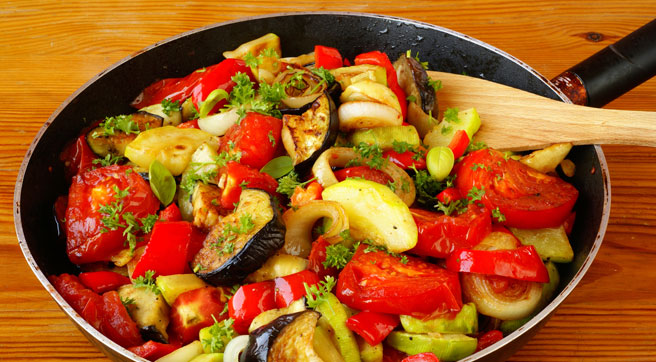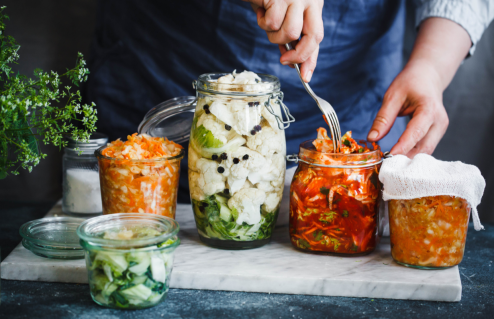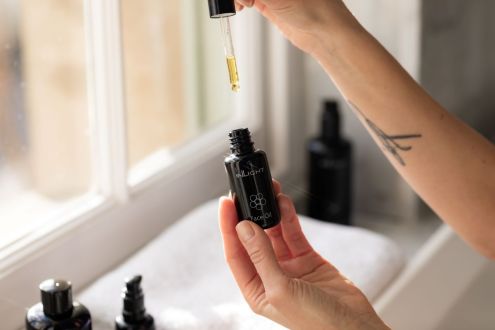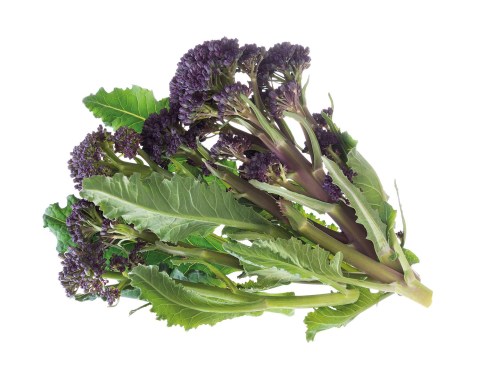10 ways to get more nutrients
The way we prepare, store or buy food could make a healthy diet even better. Here’s how to increase your nutrient intake without changing what you eat. By Helen Foster

1. Don’t cut before you cook
Boiling vegetables whole is the new way to healthy. Scientists at the US’s Agricultural Research Service have found that potatoes retain 50 per cent more potassium when cooked whole than when they are chopped, while Newcastle University research says whole carrots retain 25 per cent more of the cancer-fighting compound falcarinol. Your vegetables may taste better too. ‘Cooking carrots in pieces means flavour compounds such as sugars and acids leach into the water,’ says Dr Kirsten Brandt who carried out the Newcastle trial.
2. Enjoy what you eat
When researchers in Sweden asked a group of Thai women and a group of Swedish women to eat a Thai curry meal, they found that the Thai women absorbed 50 per cent more iron from the meal because they liked the taste. It’s believed the anticipation of eating something you’re going to enjoy stimulates your digestive system, making it more efficient at absorbing nutrients when the food does reach your stomach.
3. Eat fat
Some of the most potent health-boosting compounds in fruit and vegetables are antioxidants, which are absorbed deep in our intestines. Fat carries them there, which is why, in trials at Ohio State University, people who topped a spinach salad with avocado absorbed four times more of the antioxidant lutein and nearly 14 times more beta-carotene from the meal. Add healthy fats such as those found in olives, avocado, nuts or seeds, use their oils in salad dressings, or nutritionist Maria Griffiths suggests adding a splash of oil to cooking water. ‘I cook carrots for a whole hour on a very low heat with some water and oil. After the hour, the carrots are soft and lying in a delicious nutrient-packed juice that you can eat as well.’
4. Buy small fruits
According to US agriculture group The Organic Center, smaller items pack a bigger nutritional punch. ‘The larger a fruit or vegetable grows the more water it contains, which dilutes its nutrient levels,’ says the group’s Steven Hoffman. The effect is particularly strong in strawberries, melons and other ‘high-moisture’ fruits and veg.
5. Increase your inulin
This fibrous substance is a powerful pre-biotic, meaning it fuels the good probiotic bacteria in your digestive system. According to research by US agriculture scientist Ross Welch, probiotic bacteria create proteins that maximise the amount of nutrients you absorb from food. In his trial, high-inulin diets boosted iron absorption by 28 per cent. Foods high in inulin include artichokes, garlic, leeks, bananas and asparagus — add one or two servings a day to your diet.
6. Season food with black pepper
An ingredient in black pepper called piperine revs up digestion and in trials by US supplement company Sabinsa has been shown to increase absorption of nutrients, including beta-carotene, co-enzyme Q10 and selenium. ‘Black pepper is used in Ayurvedic medicine to stimulate the appetite and nutrient absorption,’ says Sebastian Pole, Ayurvedic practitioner and co-founder of Pukka Herbs. ‘Hot spices such as black pepper are warming and increase the heat of the digestive fire. This makes us more hungry and burns complex nutrients into a more assimilable form.’
7. Go organic
The way food is cultivated has an impact on its nutritional value. While the latest government research insists otherwise, experts at Truman State University found organic oranges to contain up to 30 per cent more vitamin C while UCLA researchers found organic tomatoes had 97 per cent higher flavanoid levels. The theory is that because they grow more slowly, they develop higher concentrations of nutrients. The same applies to meat. ‘Meat from grass-fed cattle has up to four times the amount of omega-3 fats and is three to five times higher in the anti-carcinogen conjugated linoleic acid,’ says Jo Robinson, author of Pasture Perfect.
8. Synergise your eating
‘The next big thing in nutrition is the complicated interaction between nutrients,’ says Ian Marber, author of Supereating. Eat carrots with your steak, he says, and you’ll absorb twice the iron from the red meat (carrots are rich in beta-carotene, which aids iron absorption), while eating chicken with broccoli releases up to 13 times more cancer-fighting compounds than eating the broccoli alone.
9. Lower your energy density
Energy density refers to the number of calories a food contains per gram (fruit and vegetables have the lowest energy density) so by lowering ED, you up nutrient levels. ‘Say you were having spaghetti bolognese for dinner. Halve the quantity of mince and bulk it up with vegetables,’ says Dr Elisabeth Weichselbaum from the British Nutrition Foundation.
10. Store fruit at room temperature
US research has found that some fruits continue to develop nutrients (including the phytochemicals lycopene and beta-carotene) after they have been picked if they are kept at room temperature rather than chilled in a fridge. ‘We don’t know exactly why, but it’s likely that key enzymes increase in activity at room temperature,’ says Dr Penelope Perkins-Veazie, who discovered the link at the US Department of Agriculture in Oklahoma. Watermelon, tomatoes and peaches all thrive at room temperature, she says.









